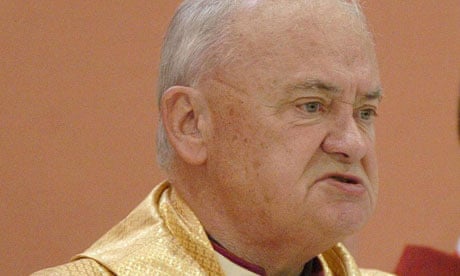A devastating report into clerical child abuse in an Irish Catholic diocese has accused the Vatican of being "entirely unhelpful" in dealing with allegations of sexual exploitation.
It also singled out an Irish bishop who was the close confidant of three popes for deliberately misleading authorities in the republic about the church's internal inquiries into children's claims that priests were abusing them.
The investigation into the diocese of Cloyne, which includes Co Cork, said Bishop John Magee had little interest in the way child sex abuse cases were handled until 2008, when the scandal had become international news.
Magee was an extremely powerful figure not only in the Irish church but also in Rome, where he had been a private secretary to three popes, including John Paul I and John Paul II. Magee was the first Vatican official on the scene when John Paul I was found dead in his quarters.
The Commission of Investigation report also said Rome's decision to brand a document on child sexual abuse as unofficial allowed individual bishops "the freedom to ignore" strict guidelines on protecting children.
The authors of the report said the Vatican's actions "can only be described as unsupportive in relation to the civil authorities" – the Garda Síochána and child protection agencies. The 431-page report, launched by the ministers for justice and children, examined allegations made against 19 priests in the diocese between 1996 and 2000.
These claims of abuse were among the most up-to-date against clergy. The report follows other damning reports in other dioceses that found a culture of cover-up and denial in the church hierarchy.
In stinging criticism of Magee, who resigned in March 2010, the report concluded: "It is a remarkable fact that Bishop Magee took little or no active interest in the management of clerical child sexual abuse cases until 2008, 12 years after the framework document was adopted.
"It became clear during the course of this investigation that Bishop Magee had, to a certain extent, detached himself from the day to day management of child sexual abuse cases. Bishop Magee was the head of the diocese and cannot avoid his responsibility by blaming subordinates who he wholly failed to supervise."
The inquiry, led by judge Yvonne Murphy, said the fact that some child sexual abuse allegations were not reported to police was the diocese's "greatest failure". There were 15 cases between 1996 and 2005 which "very clearly" should have been reported. Yet police were not told about nine cases. "The most serious lapse was the failure to report the two cases in which the alleged victims were minors.
"Given the diocese's knowledge of clerical sexual abuse and its effects on complainants it was wrong of the diocese not to put in place a proper support system for complainant."
Andrew Madden, a victim of sexual abuse while an altar boy in the Dublin archdiocese, said the report proved that, "with occasional exceptions, Catholic bishops cannot be trusted with allegations of child sexual abuse."
The Dublin Rape Crisis Centre described the Cloyne report as a "terrible indictment" of the way the church handled the allegations. Ellen O'Malley Dunlop, of the centre, said: "Here is another report which makes for unbelievable reading in relation to how the Catholic church dealt with allegations of child sexual abuse … in the diocese of Cloyne.
"There is no excuse of being on a 'learning curve' this time. The church's own child protection guidelines were in place from 1996, yet the report tells us time and time again that the implementation of the policies and procedures was inadequate and inappropriate. It was not until 2008 that the diocese began to follow proper procedures.
"The publication of this report will again reopen the wounds of the victims involved and other victims around the country who had similar experiences. It may also trigger people's memories for the first time."



